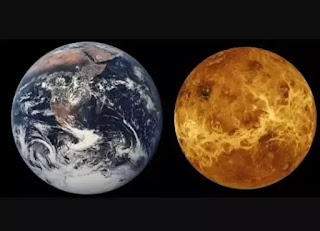Do recent discoveries point to life on Venus?
Are there signs of life in other planets? The recent discovery of Phosphine gas on Venus has raised a
very interesting possibility - that life might exist after all, beyond Earth. However, what's the chemistry
behind this? Please read on.
Venus has long been considered as the Earth's twin. Its about the same size as earth, has a similar gravity and elemental composition. There is speculation that an ocean once covered it's surface, just like Earth, and life might have existed. However, Venus is starkly different in other features.
Images of Earth and VenusVenus has an atmosphere predominantly made of carbon dioxide, a greenhouse gas. Temperatures on Venus therefore reach about 500°C. What's more, there are sulfuric acid clouds (and rains!) and intense pressure, none of which are conducive to life. But in a startling discovery, scientists have found phosphine gas in the Venusian atmosphere. This gas has one phosphorus and three hydrogen atoms (PH3), and a pyramidal shape. This gas is highly poisonous to life forms that breathe oxygen, and is largely absent in earth's atmosphere. So what does the discovery of phosphine gas mean?
There are certain bacteria on Earth that can create phosphine. These bacteria are
found in environments that do not have any oxygen. If phosphine exists on Venus atmosphere, there are
two intriguing possibilities:
1. That phosphine is created by alien forms of life similar to the bacteria on Earth; or 2. That phosphine
is created by a chemical reaction whose mechanism is yet to be understood. Let's consider possiblity 2
first.
In the solar system, phosphine is made naturally in Jupiter. Jupiter has a super hot interior and extreme
pressure that can create phosphine. But on Venus and Earth, the temperatures are lower, and
conditions do not favour reactions that create phosphine.
So there's no known reaction that can naturally create this gas on Venus, which means something else
must be replenishing phosphine. Life is the only thing that will put energy in making molecules.
Otherwise, chemical reactions only happen when they are energetically favourable.
So is life really present on Venus? The clouds there do carry the basic ingredients for life: sunlight, water
and organic molecules. In the middle layers of clouds, conditions are much less hostile. Observations
revealed that more sunlight is absorbed in the clouds than expected, an anomaly
that could be the work of aerial microbes. But while the possibility of life is really exciting, there needs
to be further evidence to conclude that life exists. Scientists warn that the detection needs to be
verified, and false fingerprints of phosphine and life need to be ruled out. Therefore scientists are
working very hard to do further experiments to decipher the mechanism of phosphine creation.
Whether it's life or not, it has to be a really exotic mechanism, because phosphine's abundance on
Venus is at least a 1000 times more than seen on Earth. Something weird is happening, and experiments
and observations from a closer vantage point might give further answers. The article reporting
phosphine on Venus was published by Jane Greaves and her team in Nature journal
https://www.nature.com/articles/s41550-020-1174-4.

"Life is the only thing that will put energy in making molecules"...
ReplyDeleteThat means that which put the temperature and pressure on jupiter to create phosphine is also technically life!
Hence there must be some thing or some ONE running the solar system :)